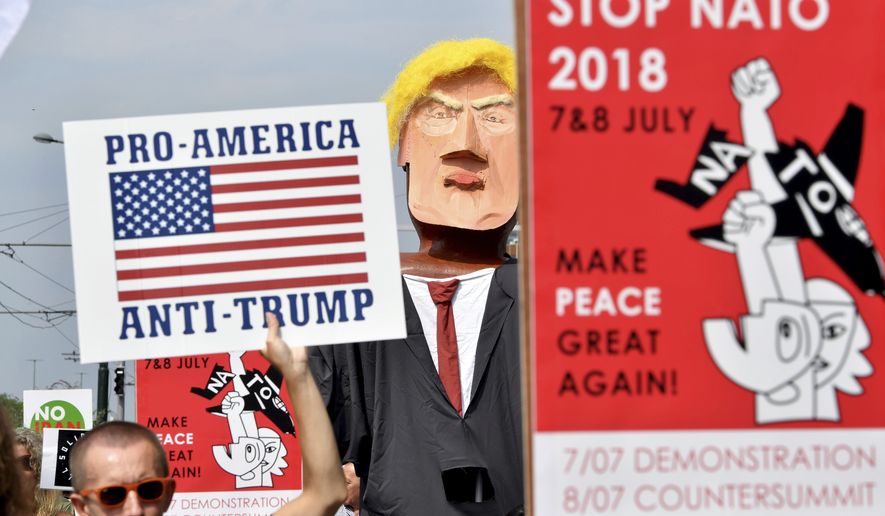President Trump got a chilly reception Tuesday at the NATO summit in Brussels from anxious and angry European leaders, but he still can count on a few friendly faces in the old military alliance.
European Council President Donald Tusk set the scene by warning Mr. Trump that he is losing friends fast.
“Dear America, appreciate your allies. After all, you don’t have that many,” the former Polish prime minister said in a rebuke of Mr. Trump’s criticism of NATO nations who are not meeting their defense spending obligations.
Mr. Tusk represents the majority opinion — a decidedly skittish view of Mr. Trump — among the 29 NATO member countries.
Mr. Trump infuriated European heads of government by demanding that their countries pay their shares for NATO, by demanding new trade deals with better terms for the U.S. and by making chummy overtures to Russian President Vladimir Putin.
Still, key allies Britain and Italy have their own beefs with Europe’s leaders in Brussels, and they will more warmly embrace the tough-talking American president.
SEE ALSO: Donald Trump claims Germany ‘totally controlled’ by Russia, airs list of grievances
The United Kingdom, with its eye on Brexit, is most likely to side with Mr. Trump, said Michael C. Desch, director of the Notre Dame International Security Center.
“In terms of a government who’s radically rethinking the nature of its committeemen to Europe, the British are the closest to the Trump administration on those issues,” he said.
Italy’s new populist government lines up squarely with Mr. Trump on a range of issues, including a firm stance to stop the mass immigration that is vexing Europe.
Italian Interior Minister Matteo Salvini even had some Trump-esque praise for Mr. Putin, whom he hoped to meet during a trip to Moscow for the Wold Cup final.
“Men like him, who look after the interests of their own citizens — we could do with dozens of them in this country,” Mr. Salvini said.
After the two-day NATO summit and a two-day visit to Britain, Mr. Trump will huddle with Mr. Putin on Monday in Helsinki.
In Brussels, Mr. Trump also has deep reservoirs of good will among some of the newer NATO members in Eastern Europe, including Poland, Romania and the Baltic states. He can look to them for support when leaders get down to business Wednesday at the alliance’s new headquarters.
Mr. Tusk chided Mr. Trump while the president was en route to Brussels.
Speaking at an EU-NATO ceremony ahead of the summit, he reminded Mr. Trump that European defense spending contributes to American security, which he said wasn’t true of Russian and Chinese military spending.
“European troops have been fighting shoulder-to-shoulder with American soldiers in Afghanistan; 870 brave men and women sacrificed their lives, including 40 soldiers from my homeland, Poland,” Mr. Tusk said. “Dear Mr. President, please remember about this tomorrow when we meet at the NATO summit, but above all when you meet President Putin in Helsinki. It is always worth knowing who is your strategic friend and who is your strategic problem.”
Mr. Tusk’s challenge to the president appeared more reflective of the EU than of Poland, where Mr. Trump is relatively popular and leaders are lobbying for a major U.S. military presence in their country.
Meanwhile, Mr. Trump kept jabbing the NATO allies as he headed for Brussels aboard Air Force One.
“Many countries in NATO, which we are expected to defend, are not only short of their current commitment of 2% (which is low), but are also delinquent for many years in payments that have not been made. Will they reimburse the U.S.?” tweeted the president.
Mr. Desch, who acknowledged that he is predisposed to opposing the Trump administration, said the president is raising important issues for NATO. The burden-sharing issue underscores larger questions about NATO’s role in a post-Cold War world that remains unanswered 26 years after the collapse of the Soviet Union, he said.
“You have to wonder why the Europeans profess so much interest in the health of NATO and worry so much about the Russian threat and then they can’t meet the pretty low 2 percent of GDP figure that NATO agreed to recently. That’s a fundamental inconsistency in the pro-NATO position,” Mr. Desch said.
Mr. Trump hammers NATO countries for skimping on defense spending, especially Germany, which is has the largest economy in Europe. Germany spends 1.24 percent of its economic output on its military and has pledged to spend 1.5 percent by 2025, still falling short of the minimum 2 percent of gross domestic product that NATO countries agreed to in 2014.
The U.S. spends 4 percent and foots the bill for about 22 percent of NATO.
Of the 29 NATO member countries, only five others spend the required 2 percent of GDP: Britain, Greece, Estonia, Romania and Poland, according to NATO data from 2017.
More are expected to be reaching the 2 percent goal, which could bode well for Mr. Trump’s list of friends at NATO.
“We expect eight allies to spend at least 2 percent of GDP on defense this year, compared to just three allies in 2014,” said NATO Secretary General Jens Stoltenberg.
• S.A. Miller can be reached at smiller@washingtontimes.com.




Please read our comment policy before commenting.